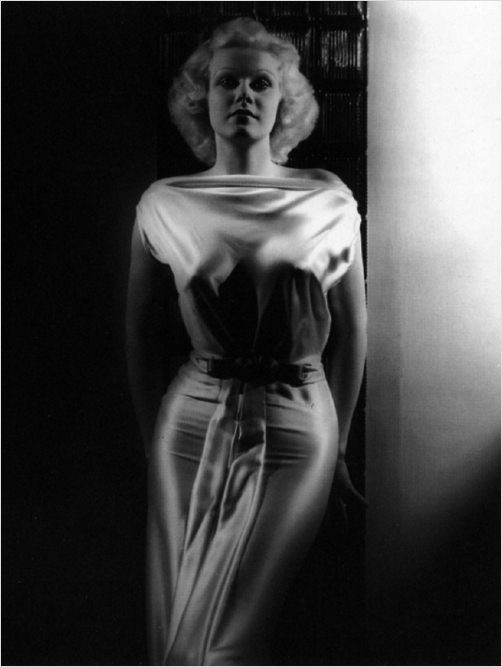By Michael Wilmington
Jean Harlow may have been the first of the movie blonde bombshells, but her sharp, saucy screen persona was quite a ways removed from that of her sublime successor, Marilyn Monroe.
Brassier and earthier than Monroe, Harlow was a bouncy sexpot who knew what she wanted and knew how to get it: a streetwise babe who lived in the real world and knew just how to manipulate it to her advantage. Harlow, like Monroe, had a baby-talk mode, but it was more clearly a put-on. Harlow’s juvenile antics, her “Daddy’s girl” banter with sugar daddies like beefy Wallace Beery let the audience firmly in on the joke.
Marilyn, or at least her screen persona, often seemed more like a little girl in a woman’s body, a blonde baby doll who never quite grew up, and often lived in a world all her own. Marilyn on screen, in some ways, is always a fantasy. Harlow on screen is usually real. Very real.
In the new TCM/Warner Home Video “Greatest Classics Legends: Jean Harlow” set, Harlow holds her own with the elite of MGM’s acting royalty — with the Barrymores (John and Lionel), and with Spencer Tracy, Clark Gable, William Powell, Myrna Loy, Rosalind Russell, and classy supporting players like Billie Burke, May Robson and C. Aubrey Smith, and even with the young James Stewart.
Holds her own? She’s a star, even in a roomful of stars. This Jean Harlow set includes the following four films.
“Dinner at Eight” (George Cukor, 1933) An MGM all-star special and in some ways, a better movie than the studio’s talent-studded “Grand Hotel” — wittier, more knowing, with a deeper, stronger cast, and more beautifully directed, by Cukor. David O. Selznick was the producer, and the source was the hit Broadway play by Edna Ferber and George S. Kaufman, with the screenplay and additional dialogue from Herman Mankiewicz, Donald Ogden Stewart and Frances Marion.
The play is classic. The script is brilliant. The direction and production are impeccable. The stellar cast, one of the all-time great Hollywood ensembles, includes Lionel Barrymore as the beleaguered shipbuilder Oliver Jordan and Billie Burke as his fluttery society wife, who’s holding a dinner (at eight) for British aristocrats Lord and Lady Ferncliffe.
On her guest list: Old-time diva actress Carlotta Vance (Marie Dressler); washed-up alcoholic Hollywood actor Larry Renault (John Barrymore, in an astounding piece of self-revelation and a classic of the actor‘s art), who’s romancing their twentyish daughter Paula (Madge Evans); voracious business shark Dan Packard (Wallace Beery) and his feisty platinum-blonde trophy wife Kitty (Harlow, in one of her best roles); smooth society doctor (and Kitty’s lover) Wayne Talbot (Edmund Lowe) and his tolerant wife (Karen Morley); and Paula’s hapless society beau (Phillips Holmes).
I’ve often thought that playwright Garson Kanin may have gotten the idea for “Born Yesterday” while watching Beery and Harlow in this film. In fact, she’s great with all her co-stars. A classic Harlow-Dressler moment is this exchange:
In the last scene, as they stroll in for dinner, Harlow muses, in a thoughtfully brassy way, “I was reading a book yesterday …”
Dressler: “Reading a book?”
Harlow: “Yes, it’s all about civilization or something, a nutty kind of a book. You know, the guy said that machinery is going to take the place of every profession! ”
Dressler, as she takes Harlow’s arm: “Oh, my dear, that’s something you need never worry about!”
It couldn’t be bettered. And neither could the movie, which, in some ways, is less another “Grand Hotel,” and more in the line of Jean Renoir’s great ensemble comedy-drama “The Rules of the Game.” Not as good, of course. Nothing is.
“Libeled Lady” (Jack Conway, 1935) Classic screwball comedy about reckless journalism, society scandals and trumped-up romance. Spencer Tracy is a hardcase newspaper editor being sued for libel (he‘s guilty), Myrna Loy is the society gal suing him, Walter Connolly is her rich father, William Powell is the newsman Casanova trying to get the goods on Myrna, and Harlow is Tracy’s long-suffering fiancé, who marries Powell (Harlow’s real-life inamorata) as part of the plot.
This one is a little overrated, but you can‘t beat that cast. And there’s a terrific fishing scene, with amateur Powell trying to pretend he’s a trout-loving sportsman while surreptitiously using an angler’s manual. I’ll bet that scene partly inspired Rock Hudson’s fishing antics in Howard Hawks’ “Man’s Favorite Sport?”
“China Seas” (Tay Garnett, 1935) Another MGM all-star special, this time set on a boat plagued by piracy and romantic rivalry — with a quadrangle that embraces brash captain Clark Gable, shady-lady songbird Harlow (in an archetypal role), British flower Rosalind Russell and sneaky crook and Harlow admirer Wallace Beery. Rough and zesty, this one lacks the high gloss of some MGM’s ensemble offerings, and the story is sometimes silly. But, like Gable and Harlow, it gets the job done.
“Wife vs. Secretary” (Clarence Brown, 1936). Magazine mogul Gable, who has a perfect marriage to super wife Loy, begins to notice the charms of his versatile secretary Harlow, whose boyfriend James Stewart gets sullen and jealous. This class-crossing sometimes-comic romantic drama is directed with polish and intelligence by the underrated Brown. The movie is a bit underrated too. It’s also an off-type role, a noble working girl, by Harlow, and one of her subtlest, most realistic performances.
Extras: Documentary “Harlow: the Blonde Bombshell”; Vintage comedy, musical, Fitzpatrick Traveltalk and Crime Does Not Pay shorts; MGM radio promo; Trailers.
Jean Harlow image by George Hurrell.












From FNB readers